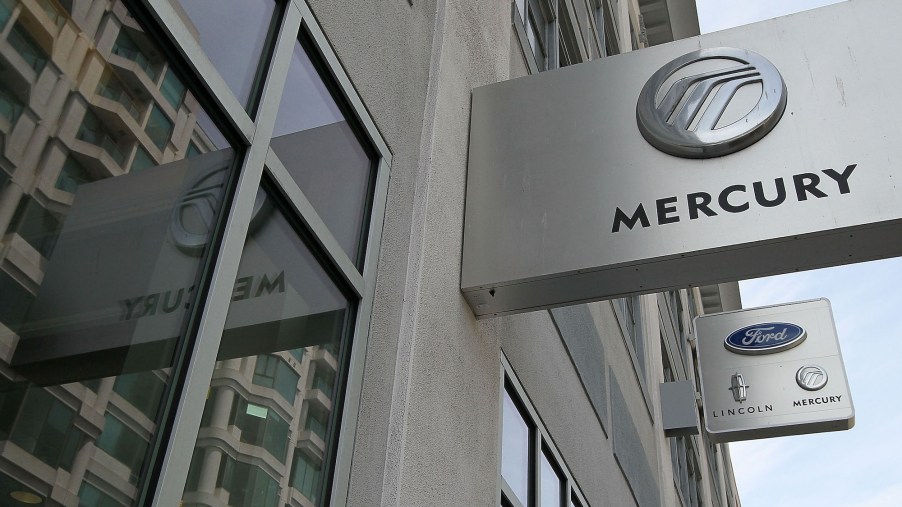
Why Did Ford Kill the Mercury Brand?
Many carmakers have come and gone in the automobile’s relatively brief history. One that disappeared only a decade ago is Mercury. The Ford Motor Company-owned brand died in 2010 after more than 70 years in business. Here’s what led to Mercury’s demise.
Mercury: A brief history
Henry Ford’s son Edsel created the Mercury brand in 1938. It was positioned as a premium brand between Ford and Lincoln. “Mercury was actually born because there was a niche between the deluxe Ford V-8 and the Lincoln Zephyr V-12,” Bob Kreipke, a corporate historian, explains on Ford‘s website. Edsel Ford chose the Mercury name, which nods to the Roman god of commerce, representing “dependability, speed, skill, and eloquence.”
The brand’s first car was the 1939 Mercury 8. It had a 95-hp V8 engine and cost $916. It proved to be very popular in the few years before World War II. With the end of the war, Ford created its Lincoln-Mercury division. In the 1950s and ’60s, Mercury developed new, modern, powerful cars. It boasted the first fixed sunroof/moonroof and created successful race cars.
One innovative 1950s Mercury was the Turnpike Cruiser, featuring “a power rear window, the ‘seat-o-matic’ adjusting seat, and the ‘Merc-o-matic’ automatic transmission,” The New York Times reported. And James Dean drove a customized 1949 Mercury Series 9CM in the 1955 movie Rebel Without a Cause.
The brand was successful for many years, and Mercury hit its peak sales of 580,000 in 1978. But in an omen of its demise, the brand stopped selling its cars in Canada in 1999, except for the Grand Marquis. Only 11 years later, Ford announced Mercury’s demise. And the brand’s last car, the Grand Marquis, rolled off the production line on January 4, 2011.
Why Ford ended Mercury production
In 2009, Mercury sold fewer than 93,000 vehicles, and the brand’s sales comprised only 0.8 percent of the American car market. Because of those low sales, Ford announced it would close Mercury by the end of 2010.
Toward the end of the brand’s life, Ford vehicles improved, chipping away at some of Mercury’s customers. Mercury also didn’t have a lot of new vehicle designs to attract customers. But because Mercury vehicles were similar to Ford’s, analysts at the time felt that losing the Mercury brand wouldn’t prompt Ford customers to defect to other manufacturers. The two brands’ consumers were nearly the same group, although Mercury also had some fleet buyers who wouldn’t mind switching to Ford vehicles.
Lincoln’s part in Mercury’s death
Lincoln’s fortunes rose with Mercury’s demise, Forbes reported at the time. In 2010, when Ford Motor Company announced Mercury’s discontinuation, the automaker also said it would expand the Lincoln brand to include seven new or redesigned vehicles.
This wasn’t the first time Ford had striven to grow Lincoln. But Ford had also invested in Jaguar, Aston Martin, Land Rover, and Volvo. The company wasn’t fully focused on Lincoln’s growth as a luxury brand, but it sold those other brands by 2010.
Edmunds chief executive Jeremy Anwyl told Forbes in 2010: “Lincoln doesn’t have much to excite us today, but if the new resources directed to the brand help replicate the turnaround of Ford, Lincoln will be in good shape within a few years.” Today, Lincoln is still Ford’s only luxury brand, but its sales remain lower than they were in the 1980s and 1990s, GoodCarBadCar reports.
Though Mercury’s demise was sad, it certainly isn’t the only American brand to go kaput. It joins Oldsmobile, Pontiac, Plymouth, and Saturn as brands that disappeared in the early part of the millennium.


